- Home
- Barry Eisler
Requiem for an Assassin Page 2
Requiem for an Assassin Read online
Page 2
Pancho returned his gaze to Demeere. “How’d you know?”
Demeere shook his head to indicate he wasn’t privy to any knowledge Pancho lacked. “I didn’t. I guessed.”
Pancho cracked his knuckles and stared at Demeere as though considering how much credence to give the man’s response.
Guthrie said, “Rain…this is the Japanese assassin, right?”
Demeere nodded. “Half Japanese. His mother was American. But he looks Japanese. At least, that’s what I’ve heard. I’ve never seen him. Not many people have.”
Hilger said, “I have.”
The third time Hilger had used Dox, the man was supposed to eliminate Rain. Dox knew Rain from Afghanistan, a connection Hilger thought would enable the former sniper to get close enough to do the job. He’d gotten close enough, all right, so close that Rain and Dox had joined forces and then in the space of a single year had torn apart two of Hilger’s operations. True, it hadn’t been personal—neither man had understood what those operations were really about—but Hilger’s losses had been considerable. Among other things, he had been forced to abandon the Hong Kong cover he had been living and relocate to Shanghai.
Also, at the disastrous conclusion of that second blown op, Dox had leveled Hilger from behind with a chair launched from the top of a riser of stairs. It could have been worse—if Dox had been properly armed, Hilger would be dead now. As it was, the massive bruise from the impact had lasted for a month; the memory, considerably longer. Hilger couldn’t deny that he took some pleasure in imagining how he would soon squeeze Dox for the information he wanted.
Pancho was still staring at Demeere. The half-Mexican was a reliable operator, but prone to feel slighted easily and to react with anger.
Hilger decided to cut short a possible argument. “Demeere was in charge of the op to try to render Rain out of Bangkok. He was running Winters and a local team there. That’s how he knew just now. How he guessed.”
Pancho eased back an inch on the bed. “How’d it go down?”
“We don’t know all the details,” Demeere said. “It seems Rain spotted the ambush Winters had set, and attacked. Two of the locals got away. Two others Rain killed with a knife. Winters was found in an alley with defensive wounds on his arms and a slashed subclavian artery. Bled out internally.”
“Rain beat Winters in a fucking knife fight?” Pancho asked. “I knew Winters. He had a kali background. Trained in the Philippines. He was good with a blade.”
“Rain’s had a lot of training, too,” Hilger said. “Judo. Boxing. Edged weapons when he was with Special Forces. And a hell of a lot of practical experience.”
Pancho nodded as though considering. Demeere looked at him and asked, “Does that make you nervous?”
Pancho returned the look. “No.”
Demeere offered a slight, chilly smile. “It should.”
Pancho smiled back. “Maybe Rain just got lucky. Or maybe Winters wasn’t being run properly.”
Guthrie said, “Anyway, the point is, Winters was good.”
Demeere, his eyes still on Pancho, said in lightly accented but otherwise perfect English, “Fuck-all good.”
“What about Calver and Gibbons?” Guthrie asked.
“Shot to death,” Hilger said. “In a Manila restroom, while they were trying to protect an agent in another op.”
Pancho looked at Hilger. “So you’re looking for payback. To take Rain out.”
Hilger shook his head. “I want him to do a job.”
Pancho squinted and pursed his lips as though thinking. Hilger didn’t know whether he was confused or disappointed or both.
“If he’s freelance,” Guthrie asked, “why not just hire him, through channels?”
“Two problems,” Hilger said. “First, I don’t know how to contact him. I tried to locate him, and couldn’t even find where he is. At one point he was known to be in Tokyo, then supposedly in São Paulo or Rio. The reports are all several years out of date, though, and I doubt he’s still living in either country. And even if he were, it wouldn’t be enough to go on. Brazil has the world’s largest Japanese expatriate community. Rain would be invisible there. More so in Japan. He always kept a low profile, but these days he might as well be a ghost.”
Guthrie said, “What’s the second problem?”
Hilger shrugged. “For now, let’s just say that I doubt what I want him for is something he’d do voluntarily. Dox is his friend, one of only a few. That means Dox knows how to contact him, and it means Dox is the leverage to make Rain cooperate.”
“They’re that close?” Guthrie said.
Hilger nodded. “I saw Dox carry Rain over his shoulder out of a firefight at Kwai Chung harbor in Hong Kong. Five million dollars in play, and Dox walked away from it to save his partner when he got hit. So I’d say they’re close, yeah.”
Pancho said, “What you’ve got in mind, the thing you want Rain for, you can’t handle in-house?”
Again, Hilger detected disappointment. He shook his head. “Rain is the right resource for this. We just have to get to him.”
They were all quiet for a moment. Guthrie said, “How much time do we have, then? To snatch Dox.”
Hilger shuffled through a few more of the photos, looking for a pattern. He felt something beginning to cohere.
“We can give it a few more days,” Hilger said. “If we haven’t had an opening at that point, we can work the villa angle. But I agree with Pancho, it’s high risk and I’d prefer something else. The main thing is that we take him totally unaware. Because without the element of surprise, taking him alive and functioning is going to be bloody. Close quarters he’s not Rain, but believe me, he’s plenty dangerous.”
Pancho squinted. “Rain is that good?”
Hilger nodded, remembering how Rain had tracked him to Hong Kong. No one had ever turned the tables on Hilger like that before, and Hilger knew he was lucky to have survived it. The experience had spooked him, he had to admit, and for this, along with his more concrete rationales, he wasn’t going to let Rain continue to roam the earth when the current operation was done.
“He must be getting old,” Guthrie said. “He’s a Vietnam vet, isn’t he?”
Hilger nodded. “He went in late, though, when he was seventeen, so he’s young for that conflict. But even if his best years are past him, tell me, do you know of anyone else who’s survived in this business, on his own, with no organization to protect him, for as long as Rain?”
The room was silent.
“There’s a reason he’s survived all this time,” Hilger went on. “And it’s not luck. No one stays lucky that long. It’s because he’s good. He’s better than all the people he’s killed, and he’s killed plenty—more than we have all together. So you don’t want to think of him as old, or slow, or used up, or burnt out, or anything else he wants you to think so you’ll underestimate him. You do, and you’ll wind up another one of his statistics.”
“Like Winters,” Demeere said.
“Like Winters,” Hilger said, looking at each of them. “We don’t want any more losses like that. So we’re going to be patient for a few more days. With three of us on motorcycles and one in the van, we can cover the likely spots and converge quickly on wherever Dox is spotted. Like Guthrie said, Ubud’s not that big a town.”
Everyone nodded, accepting the matter as settled, at least temporarily. Pancho tilted his head toward the body on the floor. “You want me to bring around the van?”
Hilger nodded and started to collect the surveillance photos. They all stood.
Guthrie asked, “Where do you think we’ll spot him?”
Hilger considered one of the photos. “Look at this guy. If he weren’t such a good sniper, he’d probably be playing professional football. How much does a guy like this eat every day?”
Demeere smiled and said, “Plenty.”
Hilger nodded. “Exactly. I don’t know what kind of food supplies he’s got laid in, but sooner or later, he’s goi
ng to have to go out for more. That’s what we’re waiting for.”
2
DOX WOKE WITH a long, pleasant groan. He stretched out across the king bed, curling his toes, liking the feel of the cotton sheets against his body. From the sun on the gauze curtains, it must have been past seven. He’d slept late. But why not? He wasn’t on a job. He deserved to take it easy. Taking it easy was what Bali was all about. Hell, it was why he’d come here. It was why he’d built this villa.
He got up and walked naked across the sisal rug to the bathroom to take a leak. It was funny, when he’d first imagined this place, he thought it would be the ultimate bachelor pad. But now that it was done, he found he was reluctant to share it. Bedding down with someone inside a place he’d built himself would feel more intimate than he was ready for. Or rather, he hadn’t met anyone yet who he was ready to be that intimate with. He wanted to meet someone good, someone right, but of the many women he’d known and enjoyed, he just couldn’t get that close with any of them. There was Rain’s lady, of course, Delilah, and a man would have to be gay or in a coma not to have some kind of thing for her, but even acknowledging to yourself that you had a hankering for your bro’s woman was a dangerous thing. And doing anything to act on it would be an unpardonable sin, not to mention a declaration of war against the kind of man you’d have to be insane to want for an enemy.
Anyway, it wasn’t like he pined for Delilah or anything like that. It was more like, she was just the kind of woman he wished he could meet. Smart, confident, and of course drop-dead gorgeous. Semi-mysterious, with a tasty little edge to keep you on your toes. Like what Angelina Jolie might be if she were blond and had taken up spy work for the Mossad instead of acting.
Well, he’d keep looking. And it wasn’t like he was suffering in the meantime. He had a couple of honeys tucked away in Kuta, only an hour away, and several in Bangkok and Jakarta who went into paroxysms whenever he called to say he was coming to town.
He finished urinating, then looked at himself in the mirror. He liked what he saw: just shy of six feet and a solid two hundred twenty-five pounds, with a six-pack and no fat other than a pair of moderate love handles the ladies seemed to find endearing. Exercise was the key. He liked to do something different every day: weights, the jump rope, a Cross Fit routine, some kettlebell stuff he’d learned from the Russians and bodyweight exercises Rain had shown him. He figured his body looked about ten years younger than the forty he actually was, which was good. He wanted to be able to keep chasing twenty-five-year-olds for as long as possible without feeling like a dirty old man.
He knew he wouldn’t be able to maintain himself forever, but that didn’t really bother him. He didn’t care if he lost his hair, either, although at this point it didn’t look like he was going to. There were only two things he would miss, when the time came: being able to take out a dime-size target at five hundred yards in low light, and getting it up as quick as a fourteen-year-old with a can of Crisco and a Carmen Electra video. Young enough to get wood right away, but old enough to last pretty much as long as he wanted, that was the best thing about being forty. Waiting to come until you’d given some pretty lady as much pleasure as she could stand, until she was practically dying from it and begging you for mercy, well, if there was a better high than that on this earth, he’d like to know what it could be.
Of course, when that day came, when his hands got shaky and his pecker turned weak, he’d have to remind himself he was lucky. Not everyone lived long enough to have to deal with such eventualities. He was planning to, but you never really knew. The main thing was to enjoy yourself while you could, because in the end, everybody’s moment was brief. Especially in the line of work he was in.
He walked over to the window and opened the curtain, letting the sun warm his body. God, what a vista. Nothing but blue skies, white clouds, and green rice fields dotted with coconut trees. He loved standing here and surveying his realm, not just because the view was so good, but because this was one of the few places in the world where he felt comfortable silhouetting himself this way. He’d taken out enough people through the glass of their own windows to have developed a permanent shyness about any room with a view. Sure, he could have spent a lifetime in therapy doing successive aversion training or some other bullshit to get over his nervousness, or he could just have all his windows custom-built out of aluminum oxynitride by a company called Surmet. They called their product ALON and it could stop multiple .50 caliber armor-piercing rounds, meaning an ordinary sniper bullet had about the same chance of getting through as a mosquito. How did those MasterCard ads go? “Aluminum oxynitride bullet-resistant glass—ten dollars a square inch. Peace of mind that no one’s about to blow your brains out with a scoped rifle—priceless.”
He pulled on shorts and a tee-shirt and spent an hour hitting the weights in his first-floor exercise room, then showered and made himself a giant protein smoothie for breakfast. A cup of milk, a couple bananas, papayas, mangos, and four raw eggs. The eggs were his last, he noted—he’d have to pick up some more. And he was getting low on fruit, too.
He drank it all down while using the laptop he kept on the kitchen table to catch up on the latest horseshit in the Middle East and elsewhere. A long time ago he’d been troubled over the way he’d left the Marines, but these days you couldn’t pay him enough to be part of the government. The hypocrisy of it all was enough to make you sick. He wondered how people could stand for it. If he were a philosopher king or a benevolent dictator, the only jobs he thought he might enjoy more than his current occupation, he’d have a rule that you could only authorize a war if you were actually going to go off and fight it. That’d get the politicians singing “Kumbaya” right quick.
When he was done with breakfast and the news, he checked the URL that ran a live feed from the four CCTV cameras he had positioned around the house. Everything was normal. Not that he was expecting any visitors, of course, but a little extra assurance never hurt anyone. He wished he could get a dog—for security, a low-tech little yapper was hard to beat—but he traveled too much for it to be feasible. Maybe if he settled down a little more, found a brown-skinned woman with almond-shaped eyes. Get her pregnant, raise a family, teach the kids to hunt and fish and shoot like he could. Yeah, maybe one day.
Getting dressed to go out in Bali didn’t usually mean much—this morning, just shorts, a tee-shirt, and sandals. He would have preferred to accessorize with a baby Glock or one of the other pistols he kept handy, but you always had to weigh accessibility, concealability, the likelihood of need, and the likelihood of getting busted for violating Indonesia’s draconian gun laws. This morning, he felt the balance was against the Glock. But that didn’t mean he would be unarmed: he put a Spyderco Clipit Civilian in his front right pocket and hung a Fred Perrin La Griffe with a two-inch spear-point blade around his neck inside the shirt. He grabbed the big backpack he used for groceries, opened the garage, and took out his motorcycle, a 250cc wine-colored Honda Rebel, beat-up, dirty, and reliable as hell.
It was still morning but it was already getting hot, and the air was plenty sticky. He stood there for a moment, just appreciating the feeling of another day in paradise. He liked everything about it, the smell of the mud, even of the duck excrement that fertilized the paddies. It didn’t smell like shit to him at all, it smelled like life, real life far away from all the places covered in concrete and asphalt and choking on diesel. It smelled like the earth itself.
He pulled on his helmet, hating the thing as always because of the heat. The locals didn’t always adhere to Indonesia’s helmet ordinances, but as an obvious foreigner he found it best to do what he could to avoid standing out, especially when standing out meant disrespecting the host country’s laws.
There was no driveway as such; just a quarter-mile-long dirt road. He fired up the bike and motored slowly forward, looking around automatically as he moved, noting the hot spots, checking to see if anything seemed out of order, if anything rubbed him the wrong w
ay. There was no good way to get to him at the villa, which was half the point of its location and design, but the least worst place for an ambush would be somewhere along this road, and so he was always extra alert coming and going here. But nothing was at all amiss this morning, just the usual dogs barking agreeably in the background, the usual farmers sweating at their labors amid the thigh-high rice.
He turned right at the end of the road and picked up speed. A 250cc bike was small for a guy his size, but it’s what everyone around here used and the roads were too narrow and winding to go very fast anyway.
He pulled into the parking lot of the Bintang supermarket on Jalan Raya Ubud and killed the engine. The Bintang was in a two-story stone building with a wood-and-red-tile roof, surrounded by ferns and bamboo trees. It was by far the biggest market in town, and the one Dox liked when he needed more than just a few supplies. Out front were the usual complement of motorbikes, bicycles, and cars. A small dog, one of the scores that roamed Ubud unsupervised, lay in the shade under the front awning, conserving its energy in the gathering tropical heat.
Inside the store, a couple of mothers with diapered toddlers in tow prowled the cramped aisles, shopping for tonight’s dinner, a few household supplies, maybe a bit of candy to keep the baby smiling. Dox had nowhere special to go, and spent a leisurely half-hour moving methodically through the store and loading up a small cart. When he was done, he rolled up to the register, where a pretty girl he knew as Wan was working.
“How are you today, Mr. Dox?” the girl asked him with a beautiful Bali smile.
Dox smiled back, but kept a little distance in his expression. Wan was a tasty-looking little treat, no question, but a sensible man knew not to shit where he ate. Or in this case, shopped. Besides, he could get all he wanted and more an hour away, in Kuta and Sanur.
“Fine, Wan, and how about you? Putting up okay with the heat?”

 All the Devils
All the Devils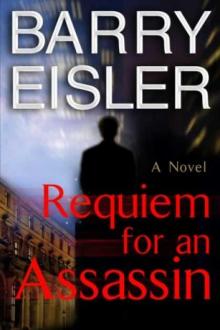 Requiem for an Assassin
Requiem for an Assassin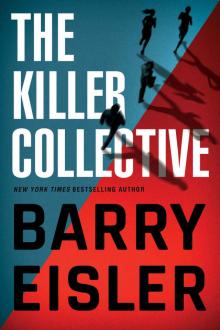 The Killer Collective
The Killer Collective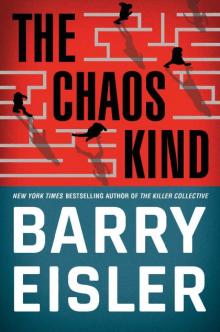 The Chaos Kind
The Chaos Kind The God's Eye View
The God's Eye View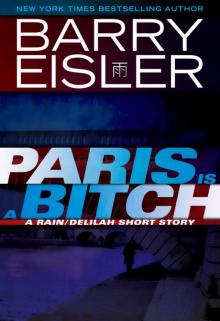 Paris is a Bitch
Paris is a Bitch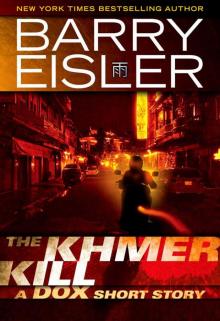 The Khmer Kill: A Dox Short Story (Kindle Single)
The Khmer Kill: A Dox Short Story (Kindle Single)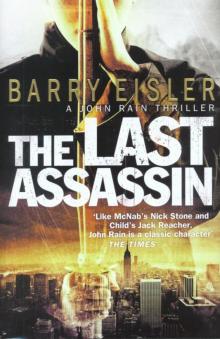 The Last Assassin
The Last Assassin The Detachment
The Detachment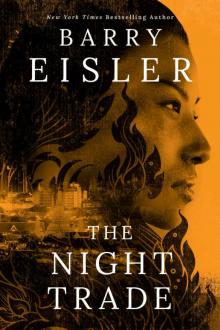 The Night Trade (A Livia Lone Novel Book 2)
The Night Trade (A Livia Lone Novel Book 2)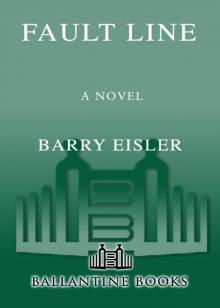 Fault Line
Fault Line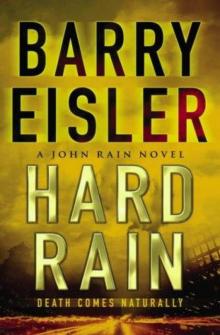 Hard Rain
Hard Rain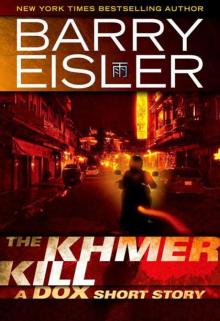 The Khmer Kill_A Dox Short Story
The Khmer Kill_A Dox Short Story London Twist: A Delilah Novella
London Twist: A Delilah Novella The Lost Coast
The Lost Coast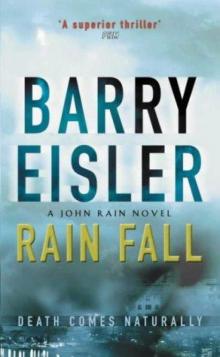 Rain Fall
Rain Fall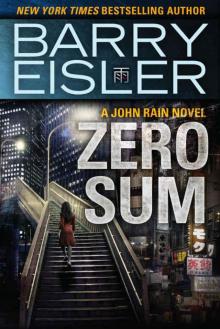 Zero Sum
Zero Sum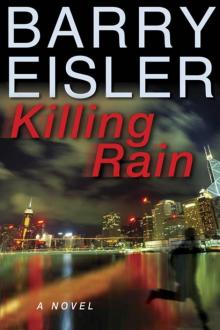 Killing Rain
Killing Rain John Rain 08: Graveyard of Memories
John Rain 08: Graveyard of Memories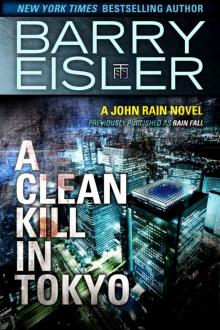 A Clean Kill in Tokyo (previously published as Rain Fall)
A Clean Kill in Tokyo (previously published as Rain Fall) Inside Out: A novel
Inside Out: A novel John Rain 07 - The Detachment
John Rain 07 - The Detachment Graveyard of Memories
Graveyard of Memories The Lost Coast -- A Larison Short Story
The Lost Coast -- A Larison Short Story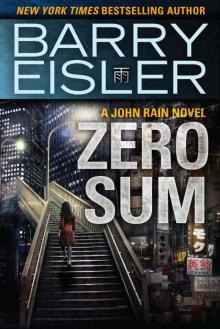 Zero Sum (A John Rain Novel)
Zero Sum (A John Rain Novel)